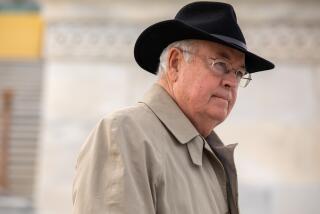Hubbell’s Fall Deals Deep Personal Setback to Clinton : Friendship: The legal difficulties of former aide serve as a political blow to the President. But the real pain is the loss of a confidant.
- Share via
WASHINGTON — The fall of Webster L. Hubbell is a political blow to President Clinton, but is an even deeper wound on a personal level.
In a short statement, the President said he was “saddened by today’s events.” White House aides noted that Hubbell’s plea-bargain on fraud and tax evasion charges was unrelated to Clinton’s and First Lady Hillary Rodham Clinton’s legal problems arising from the Whitewater affair.
But it is not hard to imagine that the President’s anguish over his close friend’s fate compounds the grief he still feels over the July, 1993, suicide of Hubbell’s former law partner and White House attorney Vincent Foster.
A source close to the Clintons said Tuesday that their reaction is one of “sadness, surprise and empathy for (Hubbell’s) family.”
But one source familiar with Clinton’s thinking says that despite his sympathy for Hubbell, the President did not feel responsible for his friend’s fall, which was the result of fraudulent actions Hubbell undertook while in private law practice in Little Rock. Clinton believes that Hubbell brought his problems on himself by cheating the government and his partners at the Rose Law Firm, the source said.
Clinton’s real pain will be in the loss of a confidant, a man with whom he could share a golf outing or a quiet drink. Hubbell’s value to the President was often his mere unquestioning presence and his laconic companionship.
Mutual friends who have seen Clinton and Hubbell together said they often spent long periods in each other’s company without speaking, whether out on the golf course or lounging around watching the Arkansas Razorback basketball or football teams on television.
“They were personally very close, friends for a long, long time,” said Skip Rutherford, a Little Rock public relations consultant and a friend of both men. “He was more than a personal friend, someone to go to the football games with, to call up to go out to dinner. Webb was somebody that Clinton could just relax with.”
What a long time ago November, 1992, must now seem for both men. One of the first post-election photos of the victorious Clinton shows him grinning in a golf cart alongside his old pal Webb Hubbell.
There was little doubt that Hubbell would accompany the Clintons to Washington; the only question was in what capacity. Hubbell landed at the Justice Department, where he served as chief contact with the White House as Clinton stumbled through the process that began with the failed nomination of Zoe Baird as attorney general and eventually ended seven weeks later with the confirmation of Janet Reno as the nation’s top law enforcement officer.
Even after Reno was sworn in, Hubbell remained Clinton’s eyes and ears at Justice as associate attorney general, the department’s No. 3 post.
After the conflagration at the Branch Davidian compound at Waco, Tex., Clinton called Hubbell--not Reno--for information. In a television interview shortly after the disaster, Reno insisted that she was accountable for the botched FBI raid, but admitted that she had not spoken to the President. Reno said that Clinton had “had a direct conversation with Webb Hubbell” about the affair.
Hubbell’s relationship with the Clintons dates to the mid-1970s, when Hillary Clinton joined the Rose Law Firm to work alongside Hubbell and Foster as her husband moved to Little Rock to become Arkansas’ attorney general.
Hubbell was already something of a local celebrity, having played on the Sugar Bowl-bound Arkansas Razorbacks football team in the late 1960s. In 1978, Hubbell was appointed to a vacancy on the City Board of Little Rock, and a year later, at age 31, was elected by his fellow board members to serve as mayor.
Hubbell’s financial dealings in the early 1980s came under scrutiny during his confirmation hearings. Roy Drew, a broker with the local E. F. Hutton office and a next-door neighbor of Hubbell, urged the Senate Judiciary Committee to investigate Hubbell’s profits from a 1983 stock deal.
Drew, a longtime critic of the Clintons, said Hubbell instructed him to buy 500 shares of Arkansas Louisiana Gas Corp Inc. (Arkla), a regulated natural gas utility with a mediocre reputation.
Hubbell sold the bulk of his shares seven weeks later for a substantial profit, shortly before it was revealed that Arkla was a potential takeover target. Thomas (Mack) McLarty, Clinton’s boyhood friend and former White House chief of staff, was then on Arkla’s board of directors and later became its chief executive.
Drew suspected that Hubbell benefited from inside information in his Arkla trading, but no impropriety was ever established by the Senate panel.
In 1984, Clinton appointed Hubbell to be chief justice of the Arkansas Supreme Court, to fill a six-month vacancy. Three years later, Clinton called upon his friend again, to chair a commission charged with writing a new ethics statute for the state.
Meanwhile, Hubbell, Foster, Hillary Clinton and a fourth young Rose partner, William H. Kennedy III, engineered a coup that ousted the firm’s managing partner and essentially took over management of the august 150-year-old firm.
Although several partners left Rose after the “Gang of Four” takeover, no bitterness was directed toward Hubbell, who remained highly popular within the firm as a mediator among senior partners.
Times staff writer Ronald J. Ostrow contributed to this story.
More to Read
Sign up for Essential California
The most important California stories and recommendations in your inbox every morning.
You may occasionally receive promotional content from the Los Angeles Times.









